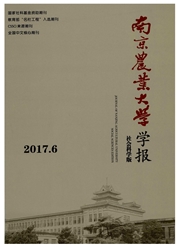

 中文摘要:
中文摘要:
综合认知和制度两个理论视角,发展了一个理论模型来解释消费者对食品安全信任的影响因素。模型假设个人特征因素(知识、经验和社会人口统计特征)和制度因素(对食品链相关主体信任和潜在惩罚力量)共同决定消费者对食品安全的信任。研究把食品分为生鲜食品和加工食品,利用来自北京市的1165个消费者样本对模型进行检验。结构方程模型的结果显示,五个变量(经验、年龄、对政府信任、对生产商信任和潜在惩罚力量)与生鲜食品安全信任和加工食品安全信任都存在显著关系。此外,其他三个变量(知识、收入和对零售商信任)影响加工食品安全信任,但不影响生鲜食品安全信任。
 英文摘要:
英文摘要:
An integrated model is established to explain what factors influence consumer trust in food safe?ty from both the cognitive perspective and the institutional perspective.It assumes that individual characteristics (education,experience,and socio-demographics) and institutional factors (trust in food institutional actors and potential punishment power) jointly determine consumer trust in food safety.Two measures of trust in food safety are investigated:trust in the safety of fresh produce and trust in the safety of processed food.The model is tested in a sample of 1 165 consumers from Beijing municipality,China.Results of structural equation model?ing show that five variables ( experience,age,trust in government,trust in producers,and potential punishment power) are significantly associated with the two measures of trust in food safety. In addition,three other varia?bles ( education,income and trust in retailers) affect consumer trust in the safety of processed food while they do not affect trust in the safety of fresh produce. Overall,the results suggest that both theoretical perspectives are necessary for a comprehensive understanding of consumer trust in food safety.
 同期刊论文项目
同期刊论文项目
 同项目期刊论文
同项目期刊论文
 期刊信息
期刊信息
